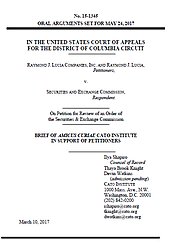Learn more about Cato’s Amicus Briefs Program.
The Securities and Exchange Commission’s use of administrative law judges is an alarming example of the breakdown of essential separation of powers in the administrative state. ALJs adjudicate most of the SEC’s enforcement actions and have the power to impose significant civil penalties and bar respondents from working in the securities industry. The lack of distance between ALJs and the SEC’s enforcement counsel may serve as a source of bias. There is a risk that ALJs may feel pressure, explicit or implicit, to support their employer agency. ALJs are also insulated from public accountability because the SEC labels them as employees rather than officers. The Constitution’s appointments clause divides federal government officials into two primary categories: officers and employees. All officers are subject to presidential removal power, while employees cannot be directly removed by the president. The president’s ability to remove officers that fail in their duties is essential for maintaining the executive branch’s accountability to the public. For this reason, jurists going back to the founding have made sure that the definition of an officer includes all officials that exercise coercive authority over others. It also why the Supreme Court has defined an officer as an official that “exercis[es] significant authority.” One would think that it is clear that SEC ALJs are officers based on these precedents. But the SEC insists its ALJs are mere employees because respondents can appeal ALJ decisions to the SEC Commissioners. This reasoning overlooks the fact that ALJs often influence respondents’ decisions to settle claims, which limits appeal. The SEC wants to have its cake and eat it too by trying cases before judges that are not fully independent yet still insulated from the public. Cato’s amicus brief in Lucia v. SEC urges the court to mandate that SEC ALJs are officers removable under the appointments clause, and thereby take a first step towards restoring accountability and due process in SEC enforcement proceedings.



